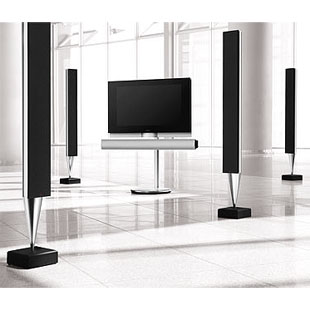Why Loudspeakers?

Putting the 'Loud' in speaker
Why speakers? Because without them you wouldn't hear any of your precious music collection or be able to listen to the sound on a DVD.
Sure, you could buy a pair of earphones or headphones, but where would be the fun be in annoying your neighbours with your choice of music then? Speakers are often considered the most important component in a sound system. Spending more on speakers will enhance your sound system more than any other investment. Unfortunately, with the growing number of speakers on the market, choosing the speakers that are right for you might be the most difficult audio decision you'll have to make.
What are my options?
Today's manufacturers offer speakers to fit a variety of needs and budgets. Main speakers are the main left and right stereo speakers in a sound system and come in two sizes: floor-standing models (generally over a metre high) for medium to large rooms and bookshelf models (those about 30cm high) for smaller rooms.
A third category is that of 'subwoofer/satellite' speakers. These speakers use very small speakers for mid and high frequencies and a subwoofer dedicated to nothing other than bass frequencies. The resulting sound rivals that of high-quality floor-standing speakers. Subwoofers come in two types, passive - which draw their power from the receiver - and powered or active speakers, which contain their own amplifiers and need an external power source.
Home cinema speaker systems are used in conjunction with a Dolby Pro Logic or Dolby Digital receiver to produce surround sound. Surround sound systems, which can be used for music as well as home cinema, include a centre channel speaker and two surround speakers in addition to the main or 'front' speakers. You can build a surround speaker system by simply adding surround speakers to your present main speaker setup. Or you can purchase complete, pre-packaged home cinema speaker systems that are matched for ideal sound.
For areas in which space is at a premium, today's in-wall speakers rival the sound of free-standing models. And state-of-the-art outdoor speakers provide quality sound while braving the worst of weather conditions. They come in free-standing and in-wall varieties. Bang & Olufsen used to have their own IWS2000 speakers for this purpose; however, the products were discontinued in 1993.
How much should I spend?
Speaker prices vary greatly. As a general rule, more expensive speakers produce better sound, particularly in the bass frequencies. The key to smart spending is determining the optimal point between the speakers you want and the speakers you need. If you were to buy a car, you wouldn't buy a sports car if you only needed it to go to the corner shop. But you may buy one if you enjoyed Sunday afternoon driving in the countryside. Likewise for a pair of loudspeakers: only buy those that you can afford and will give you good return for your investment. However, like anything else in the hi-fi world it's essential to think ahead and of your likely needs for the months and years ahead.
What main criteria should influence my choice?
When shopping for speakers, you should consider three basic criteria:
How you're going to use them
Where you're going to use them
The power rating of your receiver
If you like listening to loud rock music, you'd probably be best-served by large floor-standing speakers. They maximize bass and can be played at high volume. But if you're more into classical music, you might find that a set of bookshelf speakers is sufficient for your requirements.
The size of your listening area is another important factor to consider. Bookshelf speakers, powered by receivers with 30 to 50 watts per channel, are sufficient for rooms up to 15 square metres. But in rooms larger, you'd do better with floor-standing models or systems powered by 80 watts or more per channel. You will also want to consider the amount of available space in the room. In tight-fitting rooms, subwoofer/satellite speaker systems can provide maximum sound with minimum size.
Lastly, consider the power of your receiver when choosing speakers. If it doesn't have enough power for your speakers or listening tastes, you may get poor sound quality - and you could even damage equipment. Always buy a receiver slightly more powerful for your present situation - that way you have room to manoeuvre.
Should I get stereo or surround speakers?
If you don't have a Dolby Pro Logic receiver and you don't need one yet, the answer is easy - choose traditional stereo. Traditional stereo speakers can always be incorporated into a home cinema system as 'front' or main speakers if you choose to go that way in the future. You'll simply need to add a new centre speaker and at least two surround speakers. In the case of Bang & Olufsen active speakers, any of the range is suitable for either a traditional stereo set up or as a way of forming your own home cinema. You can mix and match as much as you want - they all complement each other both in looks and in sound quality.
If you already have a Dolby Pro Logic receiver or you're going to buy one, a complete surround sound speaker system will produce the home cinema sound you're yearning for. You can add centre channel and surround speakers to your current main system, or purchase a packaged home theatre speaker system.
It's worth noting that packaged home cinema speaker systems like a lot of manufacturers are selling nowadays provide matched sets of speakers that are ideally suited for movie soundtracks. These speakers are generally shielded so that their internal magnets do not interfere with the TV signal. This last point is very important if you are thinking of placing your speakers in close proximity to a television.
How can I test speakers?
Always use familiar CDs, DVDs or videotapes to test the full potential of speakers. Use a CD that you know particularly well and enjoy. That way you will really know what you're listening for. Second, listen to vocals. Males and female vocal music recordings are a great test of musical accuracy. Lastly, don't be fooled by how speakers sound in the showroom. They will sound very different when you bring them home. That's why the best showroom is your living room. If you're buying any speakers, always ask to hear them in your own home surroundings. A good dealer - and all Bang & Olufsen dealers should do this - would be happy to oblige. After all, it's only an our or so of his time; this time will be well spent by both parties.
Created: 10th January 2007
Modified: 2nd April 2007


